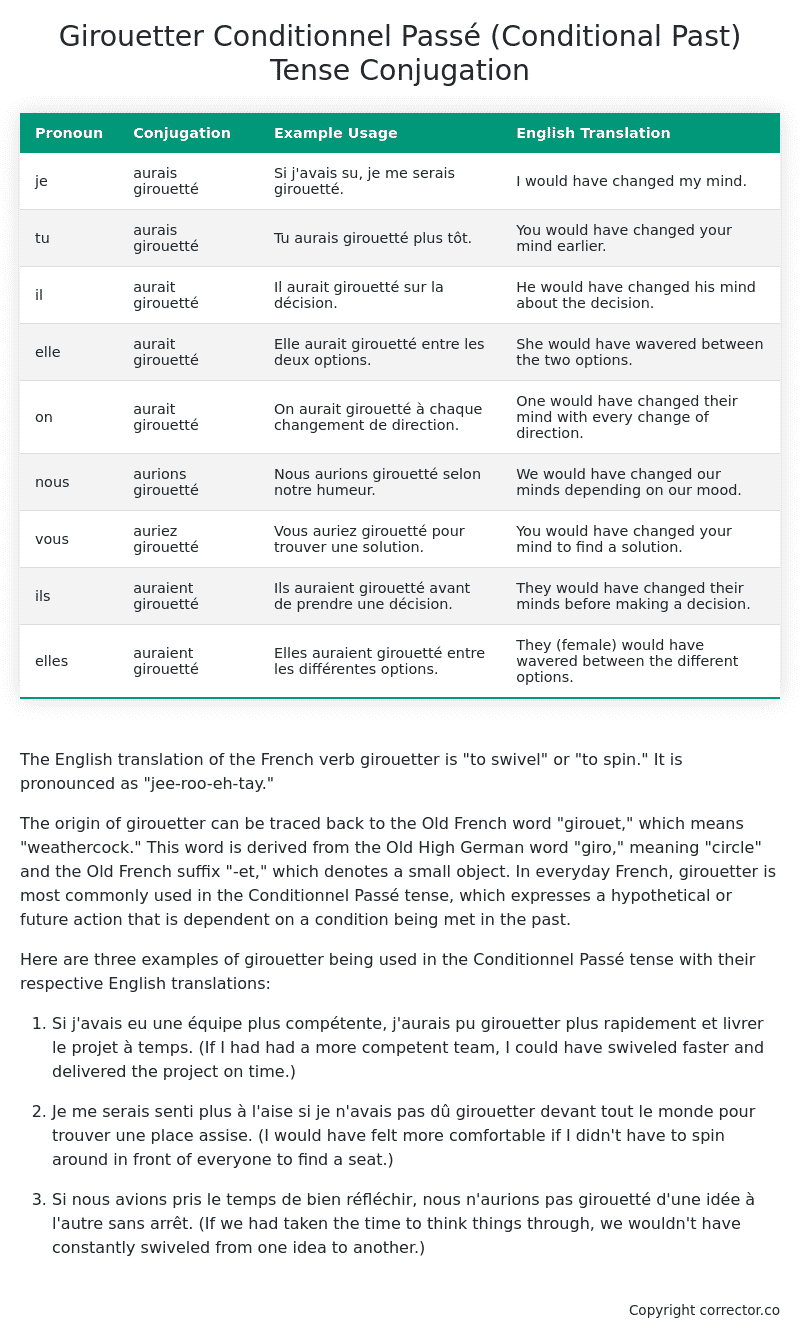Conditionnel Passé (Conditional Past) Tense Conjugation of the French Verb girouetter
Introduction to the verb girouetter
The English translation of the French verb girouetter is “to swivel” or “to spin.” It is pronounced as “jee-roo-eh-tay.”
The origin of girouetter can be traced back to the Old French word “girouet,” which means “weathercock.” This word is derived from the Old High German word “giro,” meaning “circle” and the Old French suffix “-et,” which denotes a small object. In everyday French, girouetter is most commonly used in the Conditionnel Passé tense, which expresses a hypothetical or future action that is dependent on a condition being met in the past.
Here are three examples of girouetter being used in the Conditionnel Passé tense with their respective English translations:
-
Si j’avais eu une équipe plus compétente, j’aurais pu girouetter plus rapidement et livrer le projet à temps. (If I had had a more competent team, I could have swiveled faster and delivered the project on time.)
-
Je me serais senti plus à l’aise si je n’avais pas dû girouetter devant tout le monde pour trouver une place assise. (I would have felt more comfortable if I didn’t have to spin around in front of everyone to find a seat.)
-
Si nous avions pris le temps de bien réfléchir, nous n’aurions pas girouetté d’une idée à l’autre sans arrêt. (If we had taken the time to think things through, we wouldn’t have constantly swiveled from one idea to another.)
Table of the Conditionnel Passé (Conditional Past) Tense Conjugation of girouetter
| Pronoun | Conjugation | Example Usage | English Translation |
|---|---|---|---|
| je | aurais girouetté | Si j’avais su, je me serais girouetté. | I would have changed my mind. |
| tu | aurais girouetté | Tu aurais girouetté plus tôt. | You would have changed your mind earlier. |
| il | aurait girouetté | Il aurait girouetté sur la décision. | He would have changed his mind about the decision. |
| elle | aurait girouetté | Elle aurait girouetté entre les deux options. | She would have wavered between the two options. |
| on | aurait girouetté | On aurait girouetté à chaque changement de direction. | One would have changed their mind with every change of direction. |
| nous | aurions girouetté | Nous aurions girouetté selon notre humeur. | We would have changed our minds depending on our mood. |
| vous | auriez girouetté | Vous auriez girouetté pour trouver une solution. | You would have changed your mind to find a solution. |
| ils | auraient girouetté | Ils auraient girouetté avant de prendre une décision. | They would have changed their minds before making a decision. |
| elles | auraient girouetté | Elles auraient girouetté entre les différentes options. | They (female) would have wavered between the different options. |
Other Conjugations for Girouetter.
Le Present (Present Tense) Conjugation of the French Verb girouetter
Imparfait (Imperfect) Tense Conjugation of the French Verb girouetter
Passé Simple (Simple Past) Tense Conjugation of the French Verb girouetter
Passé Composé (Present Perfect) Tense Conjugation of the French Verb girouetter
Futur Simple (Simple Future) Tense Conjugation of the French Verb girouetter
Futur Proche (Near Future) Tense Conjugation of the French Verb girouetter
Plus-que-parfait (Pluperfect) Tense Conjugation of the French Verb girouetter
Passé Antérieur (Past Anterior) Tense Conjugation of the French Verb girouetter
Futur Antérieur (Future Anterior) Tense Conjugation of the French Verb girouetter
Subjonctif Présent (Subjunctive Present) Tense Conjugation of the French Verb girouetter
Subjonctif Passé (Subjunctive Past) Tense Conjugation of the French Verb girouetter
Subjonctif Imparfait (Subjunctive Imperfect) Tense Conjugation of the French Verb girouetter
Subjonctif Plus-que-parfait (Subjunctive Pluperfect) Tense Conjugation of the French Verb girouetter
Conditionnel Présent (Conditional Present) Tense Conjugation of the French Verb girouetter
Conditionnel Passé (Conditional Past) Tense Conjugation of the French Verb girouetter (this article)
L’impératif Présent (Imperative Present) Tense Conjugation of the French Verb girouetter
L’infinitif Présent (Infinitive Present) Tense Conjugation of the French Verb girouetter
Struggling with French verbs or the language in general? Why not use our free French Grammar Checker – no registration required!
Get a FREE Download Study Sheet of this Conjugation 🔥
Simply right click the image below, click “save image” and get your free reference for the girouetter Conditionnel Passé tense conjugation!

Girouetter – About the French Conditionnel Passé (Conditional Past) Tense
Formation
Common Everyday Usage Patterns
Expressing Unreal Past Scenarios
Polite Requests or Suggestions
Expressing Doubt or Uncertainty
Interactions with Other Tenses
Conditional Present
Indicative Past Tenses
Conditional Future
Summary
Want More?
I hope you enjoyed this article on the verb girouetter. Still in a learning mood? Check out another TOTALLY random French verb conjugation!


